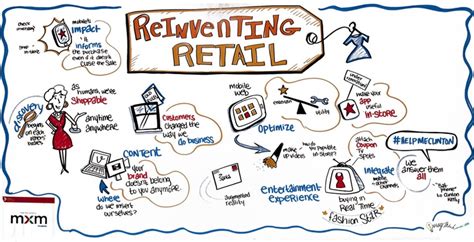The retail industry is an ever-evolving and dynamic field that requires a deep understanding of consumer behavior, market trends, and business management. As the industry continues to grow and change, the demand for highly skilled and knowledgeable retail professionals is also on the rise. This has led to an increased focus on education and training in retail management and merchandising programs in universities across America.
In this blog post, we will take an in-depth look at the world of retail management education, exploring the importance of such programs, the curriculum and course offerings available, the hands-on training and internship opportunities provided, and the career prospects for graduates. We will also delve into the expertise of faculty members and their industry connections, as well as the success stories of students and the support provided by alumni networks. Additionally, we will discuss the latest industry trends and innovations, and the future prospects and advancements in the field of retail management. Join us as we explore how American universities are reinventing retail education for the next generation of industry leaders.
Table of Contents
Understanding the Retail Industry
The retail industry is a diverse and dynamic sector that encompasses a wide range of businesses and activities. From brick-and-mortar stores to e-commerce, the retail industry plays a crucial role in the global economy. It involves the buying and selling of goods and services to consumers, and is constantly evolving to meet the changing needs and preferences of customers.
One of the key aspects of understanding the retail industry is recognizing the importance of customer experience and satisfaction. Retailers must focus on creating a positive and seamless shopping experience for their customers, both online and offline. This involves everything from product selection and pricing, to store design and customer service.
Another important factor to consider when delving into the retail industry is the impact of technology and innovation. As consumers become more digitally savvy, retailers must adapt and embrace new technologies to stay competitive. This includes implementing e-commerce platforms, mobile payment options, and personalized marketing strategies.
Overall, gaining an understanding of the retail industry requires a holistic approach that takes into account the various components that make up this multifaceted sector. By staying informed about industry trends and consumer behavior, businesses can position themselves for success in the ever-changing retail landscape.
The Importance of Retail Management Education
Understanding the retail industry is crucial for success in the field. Retail management education provides individuals with the knowledge and skills needed to excel in this fast-paced and ever-evolving industry.
With curriculum and course offerings that cover topics such as sales management, merchandising, and marketing, retail management programs in America are designed to provide students with a comprehensive understanding of the industry.
Hands-on training and internship opportunities further enhance the learning experience, allowing students to apply their knowledge in real-world settings and gain valuable experience in the field.
Faculty expertise and industry connections also play a key role in the success of retail management education, as students benefit from the guidance and insights of experienced professionals in the field.
Overview of Retail Management Programs in America
When it comes to pursuing a career in retail management, it’s important to have a strong foundation in the industry. Retail management programs in America provide students with the knowledge and skills needed to succeed in this competitive field.
These programs offer a comprehensive overview of the retail industry, including the principles of merchandising, inventory management, and customer relations. Students are also exposed to the latest trends and technologies shaping the retail landscape, preparing them to navigate a rapidly changing market.
One of the key advantages of pursuing a retail management program in America is the opportunity for hands-on training and internships. This allows students to gain practical experience and build valuable connections within the industry before they even graduate.
With experienced faculty and strong industry connections, retail management programs in America provide a solid foundation for students looking to launch successful careers in retail management.
Curriculum and Course Offerings in Retail Management
When it comes to pursuing a degree in retail management, it is crucial to have a deep understanding of the curriculum and course offerings available. A well-rounded curriculum will provide students with the knowledge and skills needed to excel in the dynamic retail industry.
One key component of the curriculum is to focus on business fundamentals such as accounting, finance, and marketing. These foundational courses are essential for students to develop a strong understanding of business principles that can be applied to the retail sector.
In addition to the core business courses, students can also expect to take classes specifically tailored to the retail industry, including retail strategy and planning, merchandising and product management, consumer behavior, and retail analytics. These specialized courses are designed to provide students with a comprehensive understanding of the retail landscape and the skills needed to succeed in this competitive field.
Furthermore, many retail management programs also offer hands-on learning opportunities such as internships, case studies, and real-world projects. These experiences allow students to apply their knowledge in a practical setting and gain valuable industry experience before entering the workforce.
Hands-on Training and Internship Opportunities
Hands-on training and internship opportunities are critical components of a comprehensive retail management education. These experiences provide students with real-world exposure to the diverse aspects of the retail industry, allowing them to apply their classroom knowledge in practical settings.
Internships offer students the chance to work with established retail organizations, gaining valuable insights into the day-to-day operations of various retail formats. They have the opportunity to observe and learn from experienced professionals, gaining hands-on experience in areas such as merchandising, sales, customer service, and operations management.
Moreover, these experiences often serve as a stepping stone for students to secure full-time employment after graduation, as they can develop industry-specific skills and build a professional network while interning.
Ultimately, hands-on training and internship opportunities play a crucial role in preparing retail management students for the demands of the industry, giving them a competitive edge in the job market.
Faculty Expertise and Industry Connections
When it comes to pursuing a career in retail management, it’s crucial to consider the expertise of the faculty members at the educational institutions you’re interested in. The faculty are the ones who will be guiding you through your academic journey, imparting their knowledge and experience to help you succeed in the industry. Look for educators with extensive industry experience and impressive academic credentials, as they will be able to provide valuable insights and mentorship.
Furthermore, industry connections are equally important. A strong network of industry professionals can open doors for internships, job opportunities, and even mentorship. It’s essential to choose a program where the faculty members have established relationships with key players in the retail industry, offering you valuable connections that can help kickstart your career.
By selecting a program with faculty members who possess both expertise and industry connections, you can ensure that you’re receiving a high-quality education and ample opportunities for professional growth in the retail management field.
Ultimately, the faculty’s expertise and industry connections play a significant role in shaping the educational experience and future career prospects of retail management students. It’s crucial to carefully consider these factors when choosing where to pursue your retail management education.
Career Opportunities for Retail Management Graduates
Retail management graduates have a wide range of career opportunities available to them in the industry. With a strong foundation in areas such as marketing, merchandising, and inventory management, these individuals are well-equipped to pursue a variety of roles within the retail sector.
One common career path for retail management graduates is that of a retail manager. These individuals are responsible for overseeing the day-to-day operations of a retail establishment, including managing staff, optimizing sales strategies, and ensuring that the store is meeting its financial targets.
Another potential career option is in the field of merchandising. Graduates with a background in retail management may find themselves working for a retail company to develop product strategies, analyze market trends, and collaborate with vendors to create engaging merchandise assortments.
Additionally, graduates may also find opportunities in retail logistics and supply chain management, where they can apply their understanding of inventory control and distribution to ensure that products are efficiently and effectively delivered to customers.
Student Success Stories and Alumni Network
When it comes to student success stories and alumni network, our retail management program takes great pride in the achievements of our graduates. We have a strong network of former students who have gone on to make significant contributions in the retail industry. From successful entrepreneurs to top-level executives, our alumni network is a testament to the quality of education and training that our program provides.
Many of our graduates have inspiring success stories to share, detailing their journey from being students of retail management to becoming leaders in the industry. Their experiences serve as motivation and guidance for our current students, showing them what is possible with dedication, hard work, and the right education.
Our alumni network also plays a crucial role in the professional development of our current students. Through networking events, mentorship programs, and career guidance sessions, our graduates are always willing to give back to the program and help the next generation of retail management professionals.
Whether it’s through sharing their success stories or offering valuable industry connections, our alumni network is an invaluable resource for our students as they embark on their own career journeys.
Industry Trends and Innovation in Retail
In today’s rapidly changing retail landscape, keeping up with the latest industry trends and fostering a culture of innovation are critical for success. Retailers are constantly adapting to new consumer behaviors, technological advancements, and market disruptions, making it essential for professionals in the retail industry to stay ahead of the curve.
One of the prominent industry trends shaping the retail landscape is the growing emphasis on sustainability and ethical practices. Consumers are becoming increasingly conscious of the environmental and social impact of their purchasing decisions, leading retailers to integrate eco-friendly initiatives, fair trade practices, and corporate social responsibility into their operations.
Moreover, the rise of omnichannel retail is transforming the way consumers interact with brands, as they seamlessly navigate between physical stores and digital platforms. Retailers are leveraging technology to enhance the customer experience and provide personalized and convenient shopping options across multiple channels.
Furthermore, rapid technological advancements, such as artificial intelligence, big data analytics, and augmented reality, are revolutionizing the retail industry by enabling retailers to gain deep insights into consumer preferences, optimize inventory management, and create immersive and interactive shopping experiences.
Future Prospects and Advancements in Retail Management
As the retail industry continues to evolve, the future prospects and advancements in retail management are becoming increasingly important. With the rise of e-commerce and changing consumer behaviors, retail management professionals are facing new challenges and opportunities.
Technological advancements have been one of the key factors driving the future prospects in retail management. From the use of big data and analytics to artificial intelligence and virtual reality, retailers are constantly seeking new ways to enhance the customer experience and streamline operations.
Furthermore, the shift towards sustainable and ethical practices is also shaping the future of retail management. With growing consumer awareness and demand for environmentally friendly products, retail management professionals are exploring ways to integrate sustainability into their business strategies.
Omni-channel retailing is another area that holds immense potential for future advancements in retail management. The integration of online and offline channels, along with the use of mobile and social media platforms, is revolutionizing the way retailers interact with customers and deliver products.






